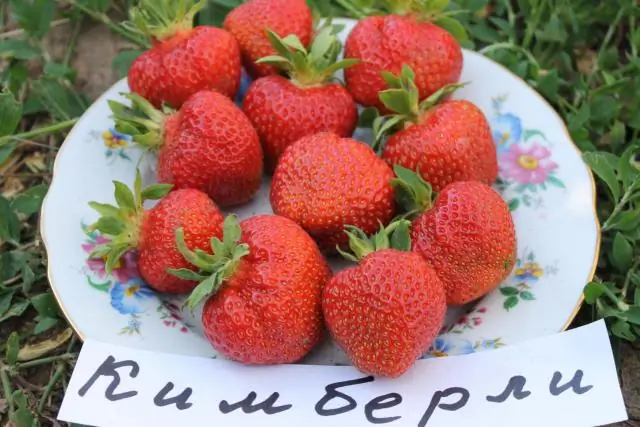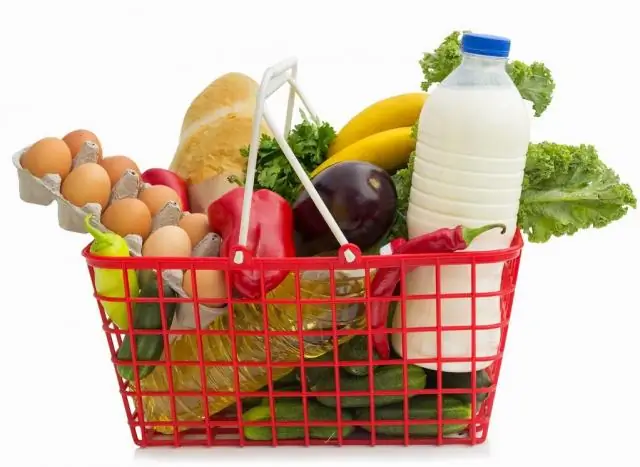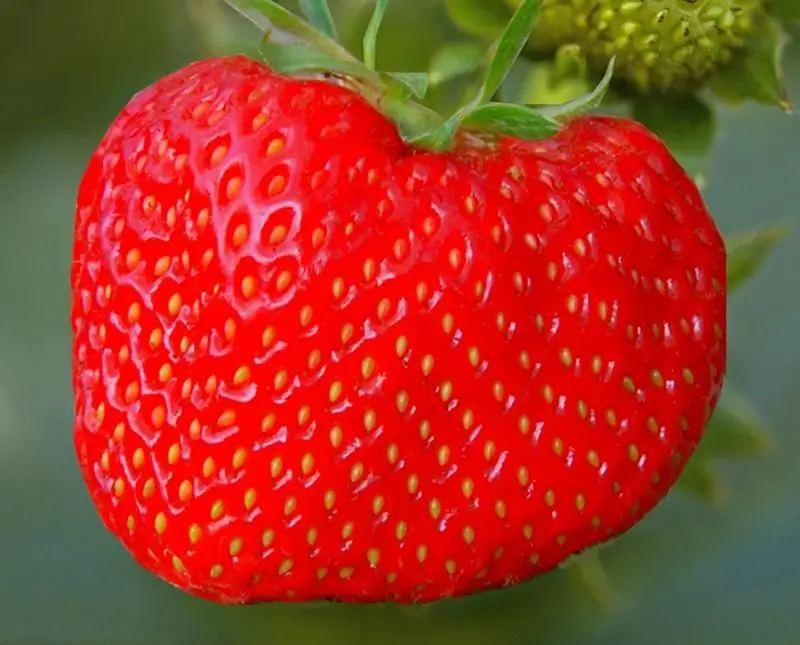
Table of contents:
- Ali Baba's strawberries: growing a fragrant berry in the garden
- What is the difference between strawberries and strawberries?
- Variety history
- Description of strawberries
- Planting and leaving
- Rules and important features of strawberry breeding
- Diseases and pests
- Harvesting and storage
- Gardeners reviews
- Author Bailey Albertson albertson@usefultipsdiy.com.
- Public 2024-01-17 22:26.
- Last modified 2025-06-01 07:32.
Ali Baba's strawberries: growing a fragrant berry in the garden

Strawberries are a favorite berry of many gardeners, which not only has an appetizing appearance, exquisite taste and aroma, but also contains a lot of useful substances. In terms of the concentration of vitamin C, only black currant is ahead of the fruits of this culture. And it contains more iron than pineapple, grapes and apples. Ali-Baba strawberries are distinguished by abundant fruiting, but in order to obtain a good harvest, it is necessary to follow some agrotechnical rules. It is also useful for the novice gardener to know the description of the advantages and disadvantages of the variety.
Content
- 1 What is the difference between strawberries and strawberries?
- 2 Variety history
-
3 Description of strawberries
3.1 Table: advantages and disadvantages of the variety
-
4 Planting and care
- 4.1 Site selection and soil preparation
- 4.2 Scheme and landing time
-
4.3 Watering and fertilizing
- 4.3.1 Table: Irrigation Scheme
- 4.3.2 Table: scheme of feeding for Ali Baba
- 4.4 What else do you need to know about growing strawberries?
-
5 Rules and important features of strawberry breeding
-
5.1 Growing by seed
5.1.1 Video: features of seed reproduction
-
5.2 Seedling method
5.2.1 Video: seedling method (bush division)
-
-
6 Diseases and pests
-
6.1 Table: typical diseases of the variety
6.1.1 Photo gallery: common diseases of Ali Baba strawberry
-
6.2 Table: main pests of strawberries
1 Photo gallery: the most common pests of the variety
-
- 7 Harvesting and storage
- 8 Reviews of gardeners
What is the difference between strawberries and strawberries?

Ali Baba's strawberries are an unpretentious and fertile culture
Many gardeners are confused between the concepts of garden strawberries, forest strawberries, and strawberries. Let's try to understand this diversity.
The strawberry, which today is presented to many as a large bulk berry, is actually a relative of the wild berry. Its fruits are small, slightly elongated, have a very sweet taste and rich aroma. This crop grows in a dense carpet over the site, but gives a meager harvest. Therefore, it is often used as a material for landscape decoration of the territory. Strawberries are divided into female and male plants, for this reason the yield is relatively low.
But those large, scarlet and juicy berries that can be found in almost every garden are garden strawberries. Garden strawberries are famous for their good yields. This is due to the presence of bisexual flowers with stamens and pistils in the culture, which are capable of self-pollination.
And finally, the common wild strawberry is a bush with small fragrant berries. Differences with strawberries are in appearance and yield. Strawberry fruits are smaller, rounded and have a bright red hue.
Variety history
Ali Baba's remnant strawberry was bred by Dutch breeders. It is the result of the work of Hem Genetics employees who have strived to create a high-yielding variety. The resulting culture has many positive properties, due to which it is in demand among gardeners. Its compact size makes it possible to grow Ali Baba in pots as an ornamental plant.
Description of strawberries

Strawberries have a distinct aroma
The strawberry bush is semi-sprawling, grows to a height of 15-20 cm. The berries are deep red and have a conical shape. Their weight is 3-5 g. Fruits are distinguished by sweet and sour taste and white pulp. They have a pronounced aroma. Ali Baba belongs to the mustache-free varieties. The number of inflorescences is 15-20 times higher than other varieties of strawberries. The variety bears fruit from mid-June until the onset of frost without interruption.
Table: advantages and disadvantages of the variety
| Benefits | disadvantages |
| Drought tolerance | Susceptibility to certain diseases |
| Good winter hardiness | |
| High taste | |
| Resistance to fungal diseases | |
| High yield |
Planting and leaving
Site selection and soil preparation

Strawberries should grow in a sunny spot in the garden
A well-lit place for strawberries is chosen. On higher elevations, planting is done so that the bush is located on level ground. If the site is in a lowland, the procedure is performed on ridges or ridges. The most suitable precursors for the plant: legumes, sorrel, garlic, mustard, soybeans, lentils, clover, rye, buckwheat.
To plant seeds, you need to prepare a soil mixture of 3 parts of sand and 5 parts of humus. The soil can contain various microorganisms that cause diseases of the root system.
To protect the plants, it is recommended to pre-steam the soil. For this, the mixture is placed in an oven heated to 90 ° C - 100 ° C for 3-4 hours. You can start planting only after the soil has cooled.
Scheme and landing time

Strawberry seedlings are planted in spring
Sowing seeds is carried out from February to April. It is important to observe the following rules:
- 2 weeks after the emergence of seedlings, the seedlings dive. That is, they are moved to other containers, observing the distance between plants of 2 cm.
- When 4-5 leaves appear, you need to make the next pick. This time, the distance between shoots is increased to 5 cm.
- After the formation of 6 leaves, the plant is transplanted into open ground. The space between the rows should be 25-30 cm, between the bushes - 20 cm.
Watering and dressing

Watering and fertilizing contributes to a good harvest
You need to start watering strawberries after flowering. Until that time, a sufficient level of moisture remains in the soil after winter.
Table: watering scheme
| Watering frequency | Liquid volume | Watering method |
| Once every 10 days. | 20 liters of water per 1 sq.m. |
At the root. Into the furrows. Drip irrigation. |
They start feeding strawberries in the second year of cultivation. For this, both mineral and organic substances are used. Potassium, superphosphate and saltpeter are added under the plant. 10 sq.m. the site will require 50 g of each substance. To prepare an organic fertilizer, you need to dilute the mullein in water in a ratio of 1: 5 or bird droppings at a rate of 1:15. Top dressing is applied according to a certain scheme.
Table: scheme of feeding for Ali Baba
| Organic fertilization | Mineral fertilization |
| After the snow melts | March-April |
| During the formation of peduncles | After fruiting |
| During flowering | |
| After harvesting the fruits |
What else do you need to know about growing strawberries?

Strawberries need to be spud and insulated for the winter
One of the stages of strawberry care is mulching. This procedure prevents the evaporation of moisture from the soil, improves its composition and prevents the growth of weeds. The soil is covered with a 10 cm layer of sawdust, straw or grass. To provide the root system with air and remove weeds, it is recommended to loosen the soil between the rows.
The strawberries are weeded three times until the berries ripen. During fruiting, it is undesirable to loosen the soil. Together with the weeds, old reddened leaves are also removed, this helps to rejuvenate the bushes.
Before the winter period, the land around the plant is spud and mulched. The snow cover is a good heat insulator: it protects the soil from freezing. In a snowless winter, a shelter should be used for strawberries. Hay, straw, or leaves work well. These materials are the most readily available, but they have some disadvantages. They accumulate moisture, cakes, and in spring they are difficult to separate from the bushes. With frequent thaws, plants can die under such shelter. Therefore, it is recommended to use spruce branches, dry raspberry branches or brushwood to protect strawberries.
You can also use Agrotex material. It is pulled on arches, which are installed in the fall over the bushes. Agrotex allows moisture and light to pass through, and reduces temperature fluctuations.
Rules and important features of strawberry breeding

Ali Baba's strawberry can be propagated by bush or seed
Ali Baba strawberries can reproduce in only two ways:
- dividing the bush;
- seeds.
Growing by seeds

The seed method is time consuming, but gives good results.
The seeds are harvested from the largest and healthiest berries. You can get them in two ways. The first involves the following actions:
- The top layer of the skin is cut from the fruit using a blade.
- The planting material is laid out on paper and dried for several days in the sun.
- Then the mass is ground to separate the seeds from the pulp. Store them at room temperature in paper bags.
Before sowing, the harvested seeds are soaked in water for 6 hours. For planting, boxes or containers of 10x30x50 cm in size will be required. Otherwise, the process has the following features:
- Drainage from broken bricks is laid at the bottom of the container so that it occupies 1/3 of the total volume.
- Then the box is filled with a soil mixture consisting of sand and humus in a 50/50 ratio.
- The earth is moistened and sowing is started. The distance between the rows should be 5 cm.
- The seeds are very small, so they are buried by a maximum of 0.5 mm.
- The boxes are covered with glass until the first shoots appear.
Seedlings will appear in 30 days. To speed up seed germination, the box can be covered with plastic and placed in the refrigerator for 2-3 days. After that, the container should be placed in a room with a temperature of 22 ° C - 25 ° C.
There is another way to plant seeds. Its features are as follows:
- First, the seeds are soaked for 6 hours. Filter paper is placed on a saucer, the planting material is spread on it, placed in a plastic bag and placed in a well-lit warm place.
- When the seeds have roots, they are transplanted into boxes using a composition of humus and sand (1: 1 ratio).
Video: features of seed reproduction
Seedling method

A healthy adult strawberry bush is divided into several parts
The seedling method is considered the simplest. An adult strawberry bush can be divided into any number of parts. The main thing is that each of them has at least 2 healthy roots. The best time for the procedure is late spring or early autumn. During frosts, the roots can be severely damaged and the bush will not be accepted.
For planting on the site, holes are first dug. Their depth should correspond to the size of the root system. A mixture of 1 kg of humus and 50 g of granular superphosphate is poured into the wells. The bush is placed in a hole. In this case, you need to ensure that the roots are well spread and do not bend. The holes are covered with soil and compacted around the bush. After planting, each plant is watered with 0.5 liters of water.
Video: seedling method (dividing the bush)
Diseases and pests
Table: typical diseases of the variety
| Diseases | Symptoms | Control methods |
| Late blight of berries |
|
Burning diseased plants. |
| White spot | The appearance of brown spots on the leaves, which subsequently acquire a white color and a dark red border. |
|
| Gray rot |
|
|
| Verticillary wilting | Withering leaves and discoloration. They turn yellow or brown. |
|
Photo gallery: common diseases of Ali Baba strawberry
-

Late blight - Strawberry late blight
-

Gray rot - Gray rot affects berries
-

Verticillary wilting - Verticillary wilting
-

White spot - White spot destroys the entire bush
Table: the main pests of strawberries
| Pests | Signs | Ways to fight |
| Spider mite |
|
|
| Slugs | The presence of eaten holes in fruits and leaves. |
|
| Strawberry leaf beetle | Ovipositions on the underside of leaves, flowers, or petioles. | Spraying before flowering and after harvesting with 0.3% lepidocide or 0.75% karbofos. |
| Raspberry and strawberry weevil | The presence of egg-laying in buds. | Treatment with 0.75% karbofos or 0.3 lepidocide during the budding period. |
Photo gallery: the most common pests of the variety
-

Slugs on strawberries - Slugs on strawberries
-

Spider mite - Spider mite
-

Raspberry and strawberry weevil - Raspberry and strawberry weevil
-

Strawberry leaf beetle - Strawberry leaf beetle
Harvesting and storage

Ali Baba gives a good harvest
Ali Baba's strawberry picking begins in mid-June. The appearance of red dots indicates the maturity of the berries. The fruits are soft and wrinkle easily, so harvest should be done in a container with low edges and a wide bottom. These can be bowls with ventilated holes, wicker baskets, plastic baking containers.
The best time to harvest is in the morning after the dew or in the evening before it appears. Such berries hold their shape longer. When harvesting, healthy and damaged fruits must be sorted out.
Fresh strawberries are stored in the refrigerator for no more than 2 days. Berries are used to make compotes, preserves, jams. In this form, strawberries can be stored for up to 2 years. Also, the Ali Baba variety is suitable for freezing.
Gardeners reviews
Vezhira
https://forum.tvoysad.ru/yagodnye-kultury-f31/zemlyanika-sadovaya-t7585-45.html
Myrz
https://homeflowers.ru/yabbse/index.php?showtopic=14870
Liana Sage
https://otvet.mail.ru/question/55166653
Caring for Ali Baba's strawberries involves regular watering, feeding and loosening. The variety is resistant to frost, but it is recommended to cover the shrubs before the onset of winter. Strawberries can be affected by pests and diseases. Timely processing will help minimize the negative effects on the plant.
Recommended:
A Variety Of Garden Strawberries (or Strawberries) Kimberly - Description, Care And Other Features + Photo

Information on planting and breeding of Kimberley strawberries (strawberries), care, planting, harvesting. Description of the variety. Reviews of gardeners about Kimberly strawberries
Chamora Turusi Variety Of Garden Strawberries - Features, Care And Other Important Aspects, The Difference Between Strawberries And Garden Strawberries + Photo

Everything about the Chamora Turusi strawberry variety: from planting and care to picking berries. Productivity, terms of fruiting, reviews of gardeners
All About Garden Strawberries (strawberries) Varieties Asia - Description, Planting, Care And Other Nuances + Photo

Description of the variety of garden strawberry Asia. Differences between strawberries and strawberries. Planting, care, reproduction. Protection against diseases and parasites. Reviews. Video. Photo
Garden Strawberries Albion: Description Of The Variety, How It Differs From Strawberries, Planting And Care, Reviews And Photos

Strawberry (garden strawberry) Albion: features, advantages, disadvantages. What do you need to know to get a rich harvest? Reproduction methods
Everything About Garden Strawberries (strawberries) Queen Elizabeth: Description Of The Strawberry Variety, Planting, Care And Other Aspects + Photo

Description of the variety of remontant strawberries Queen Elizabeth, often called strawberries: pros and cons, features of fruiting, planting, care, photos and reviews
